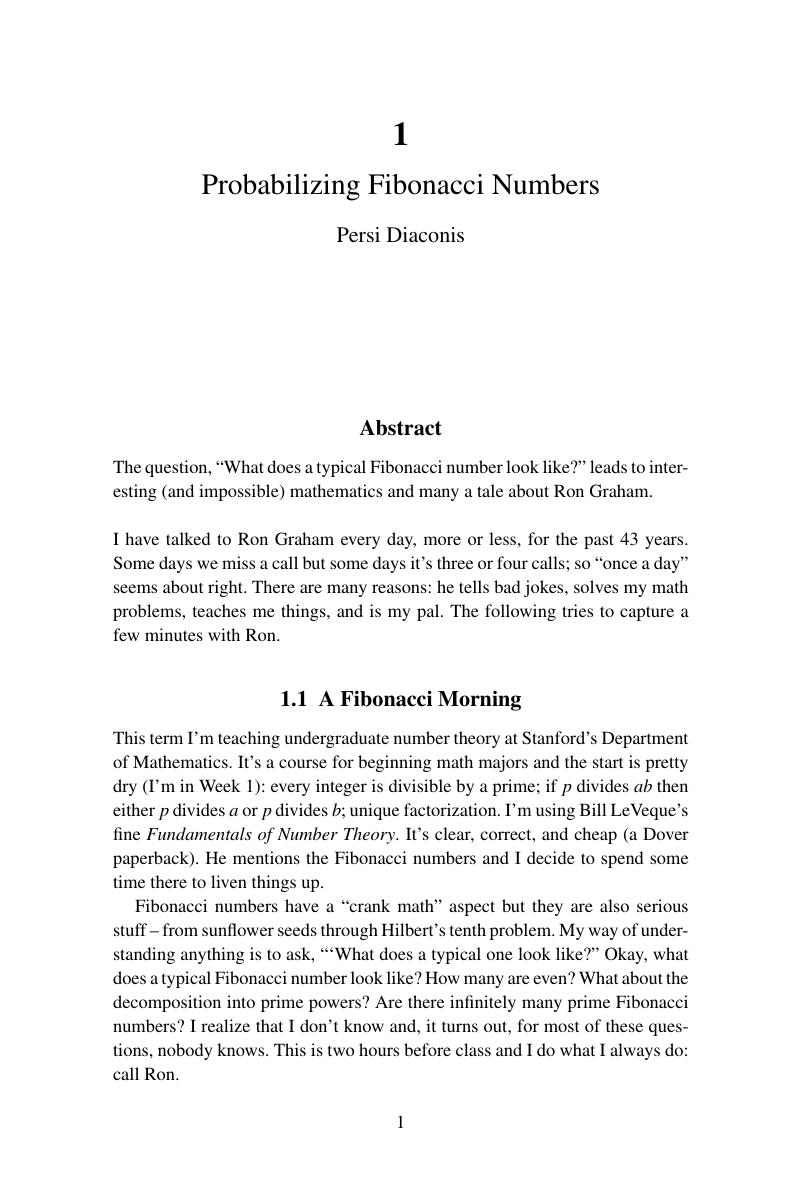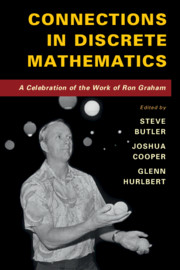Book contents
- Frontmatter
- Contents
- List of Contributors
- Preface
- 1 Probabilizing Fibonacci Numbers
- 2 On the Number of ON Cells in Cellular Automata
- 3 Search for Ultraflat Polynomials with Plus and Minus One Coefficients
- 4 Generalized Gončarov Polynomials
- 5 The Digraph Drop Polynomial
- 6 Unramified Graph Covers of Finite Degree
- 7 The First Function and Its Iterates
- 8 Erdős, Klarner, and the 3x + 1 Problem
- 9 A Short Proof for an Extension of the Erdős–Ko–Rado Theorem
- 10 The Haight–Ruzsa Method for Sets with More Differences than Multiple Sums
- 11 Dimension and Cut Vertices: An Application of Ramsey Theory
- 12 Recent Results on Partition Regularity of Infinite Matrices
- 13 Some Remarks on π
- 14 Ramsey Classes with Closure Operations (Selected Combinatorial Applications)
- 15 Borsuk and Ramsey Type Questions in Euclidean Space
- 16 Pick's Theorem and Sums of Lattice Points
- 17 Apollonian Ring Packings
- 18 Juggling and Card Shuffling Meet Mathematical Fonts
- 19 Randomly Juggling Backwards
- 20 Explicit Error Bounds for Lattice Edgeworth Expansions
- References
1 - Probabilizing Fibonacci Numbers
Published online by Cambridge University Press: 25 May 2018
- Frontmatter
- Contents
- List of Contributors
- Preface
- 1 Probabilizing Fibonacci Numbers
- 2 On the Number of ON Cells in Cellular Automata
- 3 Search for Ultraflat Polynomials with Plus and Minus One Coefficients
- 4 Generalized Gončarov Polynomials
- 5 The Digraph Drop Polynomial
- 6 Unramified Graph Covers of Finite Degree
- 7 The First Function and Its Iterates
- 8 Erdős, Klarner, and the 3x + 1 Problem
- 9 A Short Proof for an Extension of the Erdős–Ko–Rado Theorem
- 10 The Haight–Ruzsa Method for Sets with More Differences than Multiple Sums
- 11 Dimension and Cut Vertices: An Application of Ramsey Theory
- 12 Recent Results on Partition Regularity of Infinite Matrices
- 13 Some Remarks on π
- 14 Ramsey Classes with Closure Operations (Selected Combinatorial Applications)
- 15 Borsuk and Ramsey Type Questions in Euclidean Space
- 16 Pick's Theorem and Sums of Lattice Points
- 17 Apollonian Ring Packings
- 18 Juggling and Card Shuffling Meet Mathematical Fonts
- 19 Randomly Juggling Backwards
- 20 Explicit Error Bounds for Lattice Edgeworth Expansions
- References
Summary

- Type
- Chapter
- Information
- Connections in Discrete MathematicsA Celebration of the Work of Ron Graham, pp. 1 - 12Publisher: Cambridge University PressPrint publication year: 2018



